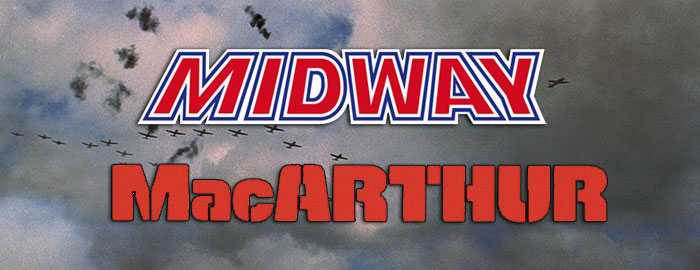

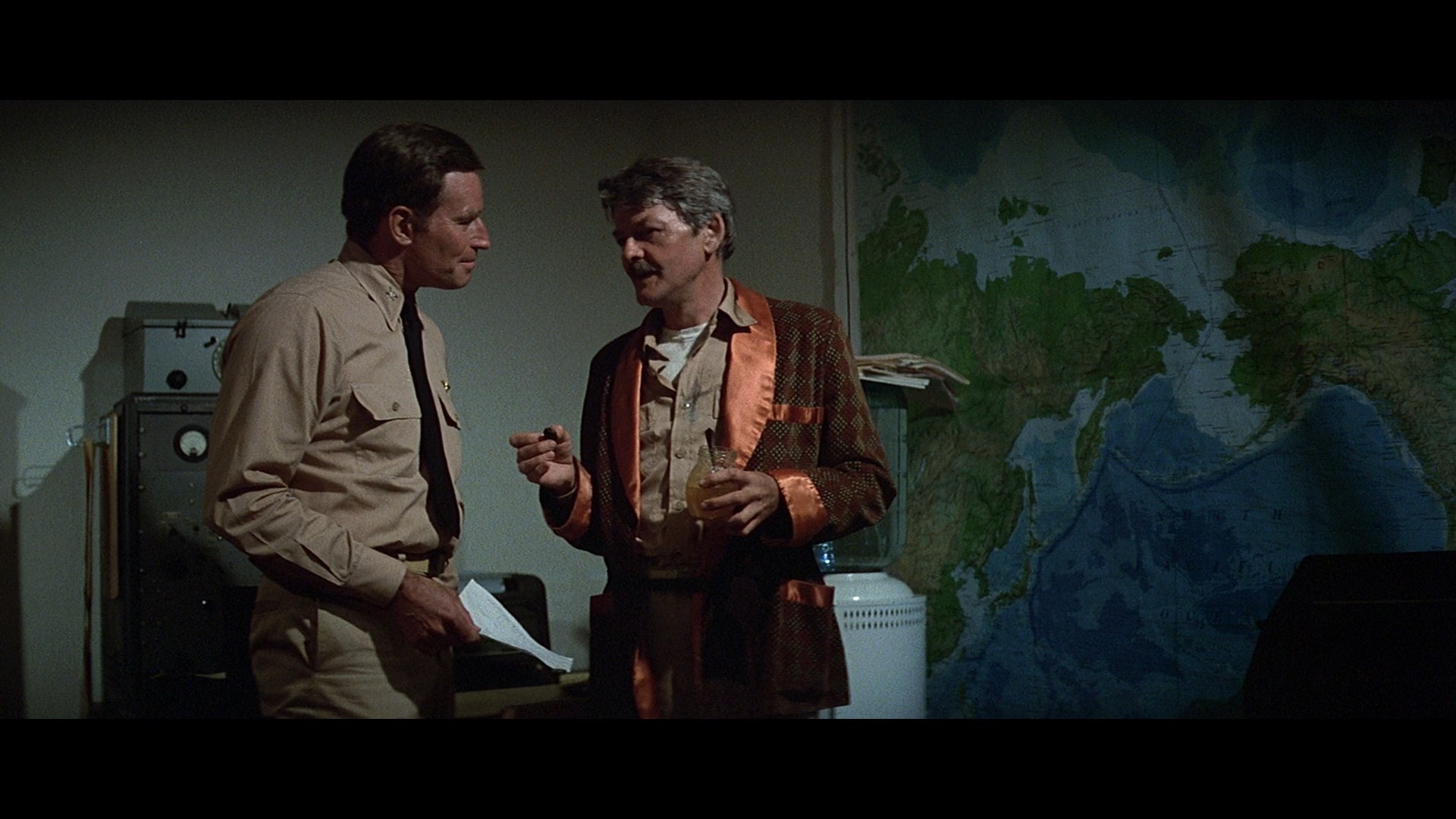 into the disaster movie fray
into the disaster movie fray 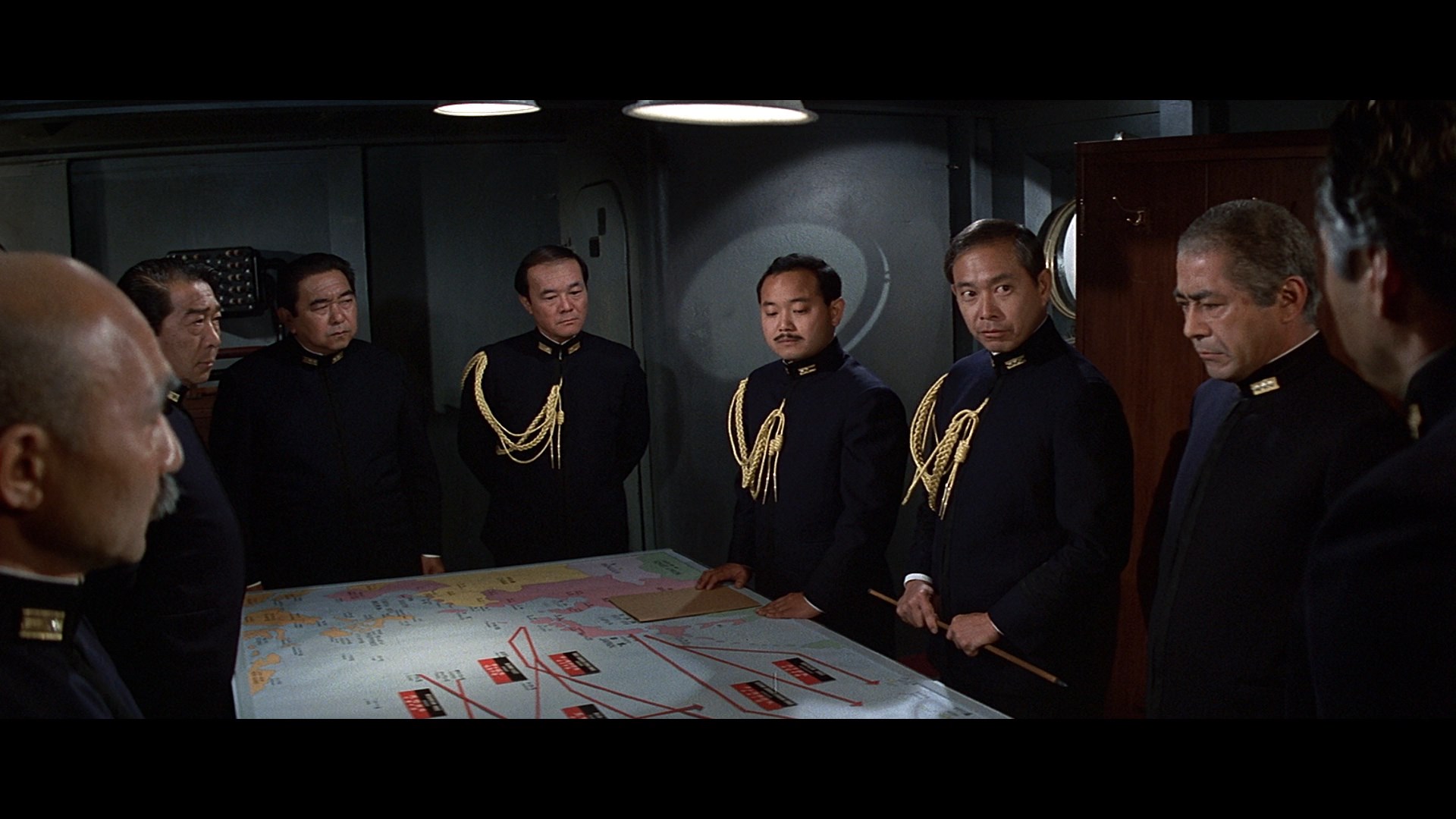 with Earthquake and the Airport films, Universal was one of the heaviest players in Hollywood in the mid-'70s. That status increased with the game-changing summer blockbuster Jaws in 1975, so the question remained what kind of event movies would come next. Audiences soon found out in 1976 as Universal tried to continue the vogue for spectacular World War II films that had reached its apex at the turn of the decade with Patton, Kelly's Heroes, and Tora! Tora! Tora! Still enthusiastically embracing its Sensurround sound format (which rattled audiences' teeth with subwoofer action) after unveiling it with Earthquake, Universal decided the next wall-shaking film would be Midway, a star-studded WWII combat film from super producer Walter Mirisch. Sensurround wouldn't make it past the decade's end, but along with the subsequent Rollercoaster, it gets a fun workout here during the big attack scenes while delivering the celebrity-heavy wattage audiences expected at the time from films with little boxes of stars' faces all over the posters. The film has also become legendary for its heavy amount of stock footage (particularly the majority of the climax), which essentially makes this the combat movie equivalent of The Prey.
with Earthquake and the Airport films, Universal was one of the heaviest players in Hollywood in the mid-'70s. That status increased with the game-changing summer blockbuster Jaws in 1975, so the question remained what kind of event movies would come next. Audiences soon found out in 1976 as Universal tried to continue the vogue for spectacular World War II films that had reached its apex at the turn of the decade with Patton, Kelly's Heroes, and Tora! Tora! Tora! Still enthusiastically embracing its Sensurround sound format (which rattled audiences' teeth with subwoofer action) after unveiling it with Earthquake, Universal decided the next wall-shaking film would be Midway, a star-studded WWII combat film from super producer Walter Mirisch. Sensurround wouldn't make it past the decade's end, but along with the subsequent Rollercoaster, it gets a fun workout here during the big attack scenes while delivering the celebrity-heavy wattage audiences expected at the time from films with little boxes of stars' faces all over the posters. The film has also become legendary for its heavy amount of stock footage (particularly the majority of the climax), which essentially makes this the combat movie equivalent of The Prey.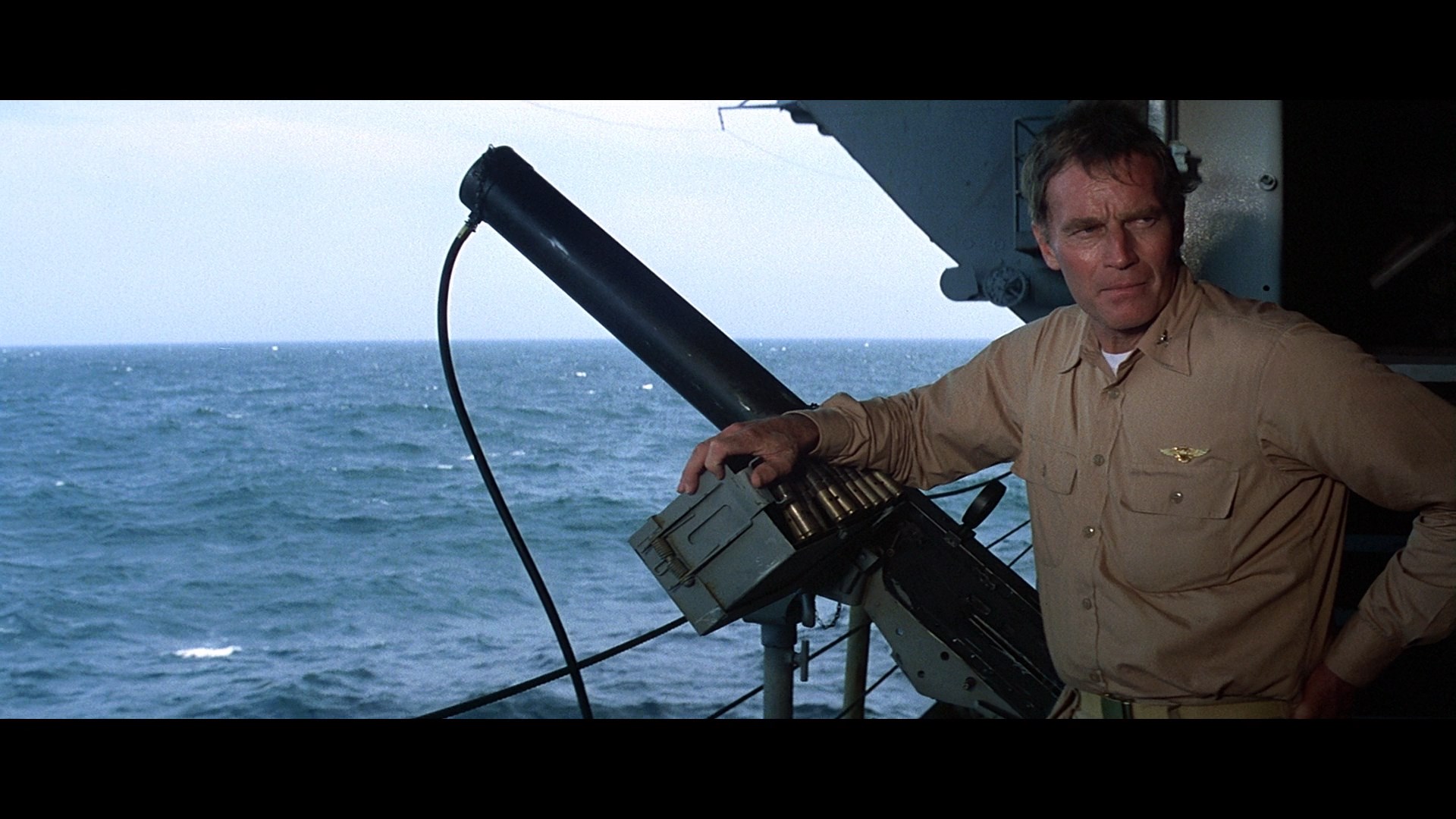 American fleet into a trap after a sudden bombing over
American fleet into a trap after a sudden bombing over 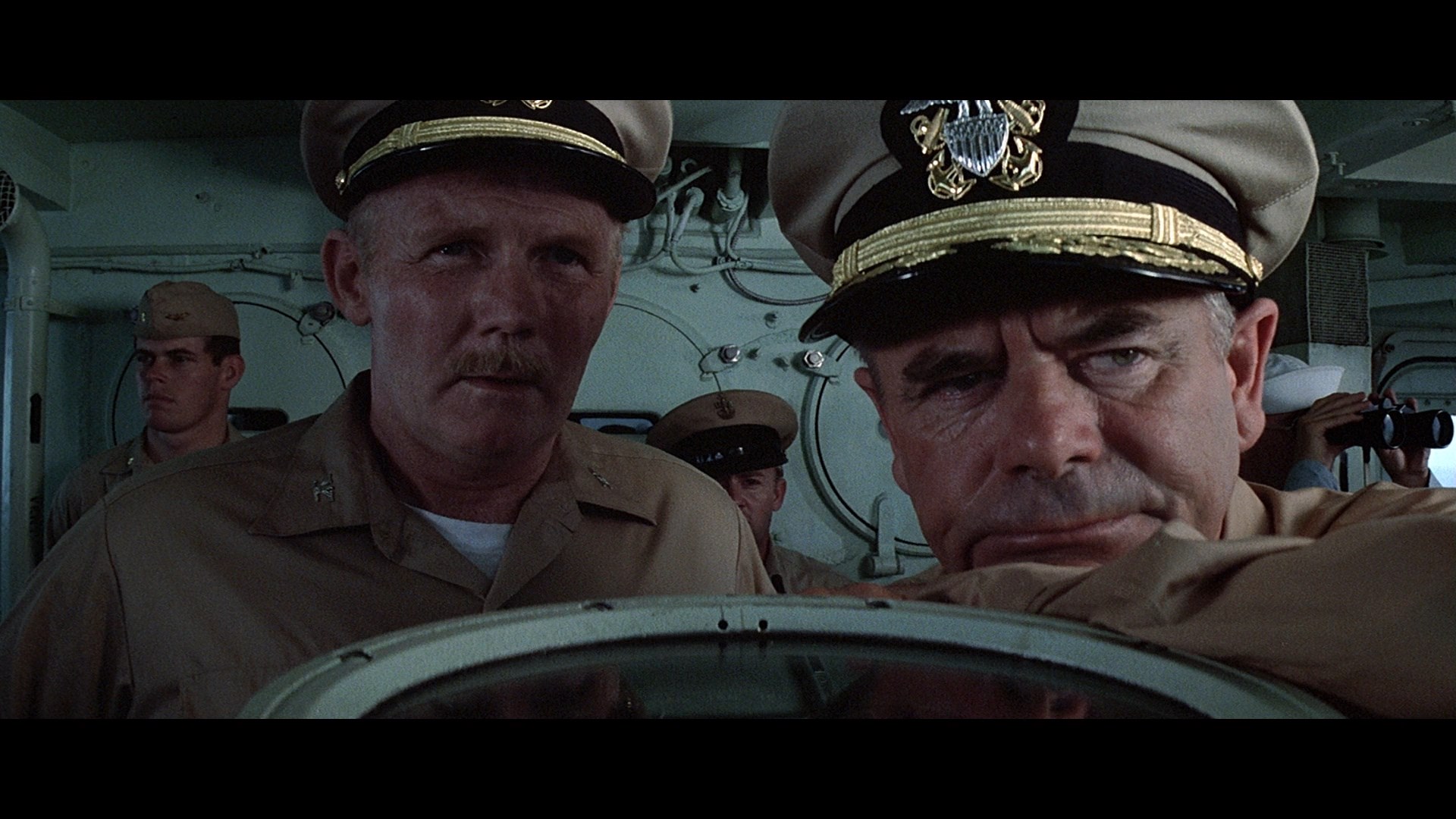 Tokyo. More or less the protagonist here is Captain Matthew Garth (Heston), who juggles the personal crisis of his son, Tom (Albert), and his interned Japanese-American wife, while trying to crack the code to communications about the impending attack. Meanwhile Admiral Nimitz (Fonda) prepares his carriers for a counterattack, believing he knows when the strike will occur. Soon land and air alike are ablaze in what will become a pivotal moment in turning the tide of the war.
Tokyo. More or less the protagonist here is Captain Matthew Garth (Heston), who juggles the personal crisis of his son, Tom (Albert), and his interned Japanese-American wife, while trying to crack the code to communications about the impending attack. Meanwhile Admiral Nimitz (Fonda) prepares his carriers for a counterattack, believing he knows when the strike will occur. Soon land and air alike are ablaze in what will become a pivotal moment in turning the tide of the war.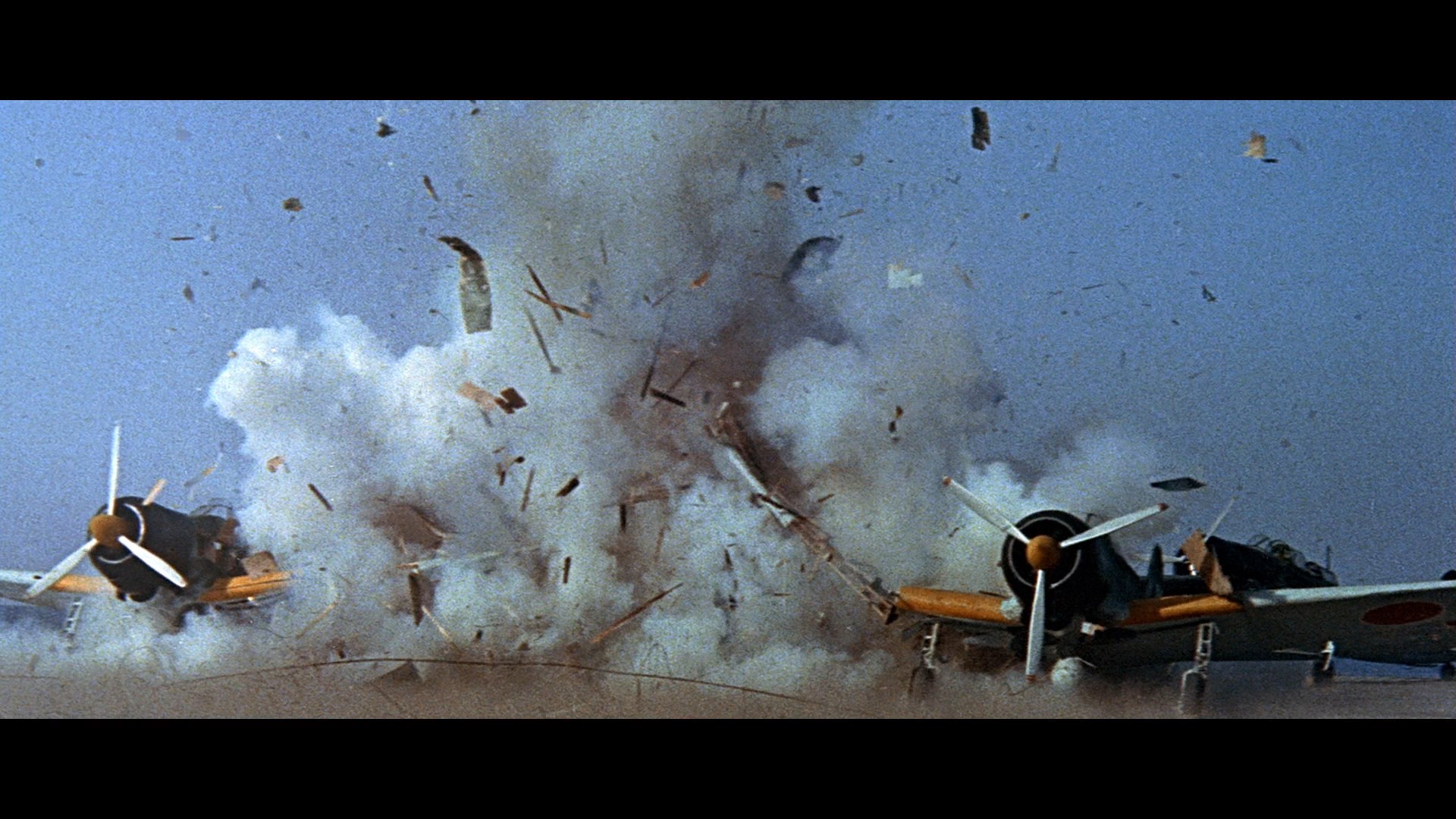 Image Entertainment as part of its early (and legally contentious) wave of catalog Universal titles. Featuring an okay anamorphic transfer and the 1.0 mono theatrical mix, it was
Image Entertainment as part of its early (and legally contentious) wave of catalog Universal titles. Featuring an okay anamorphic transfer and the 1.0 mono theatrical mix, it was 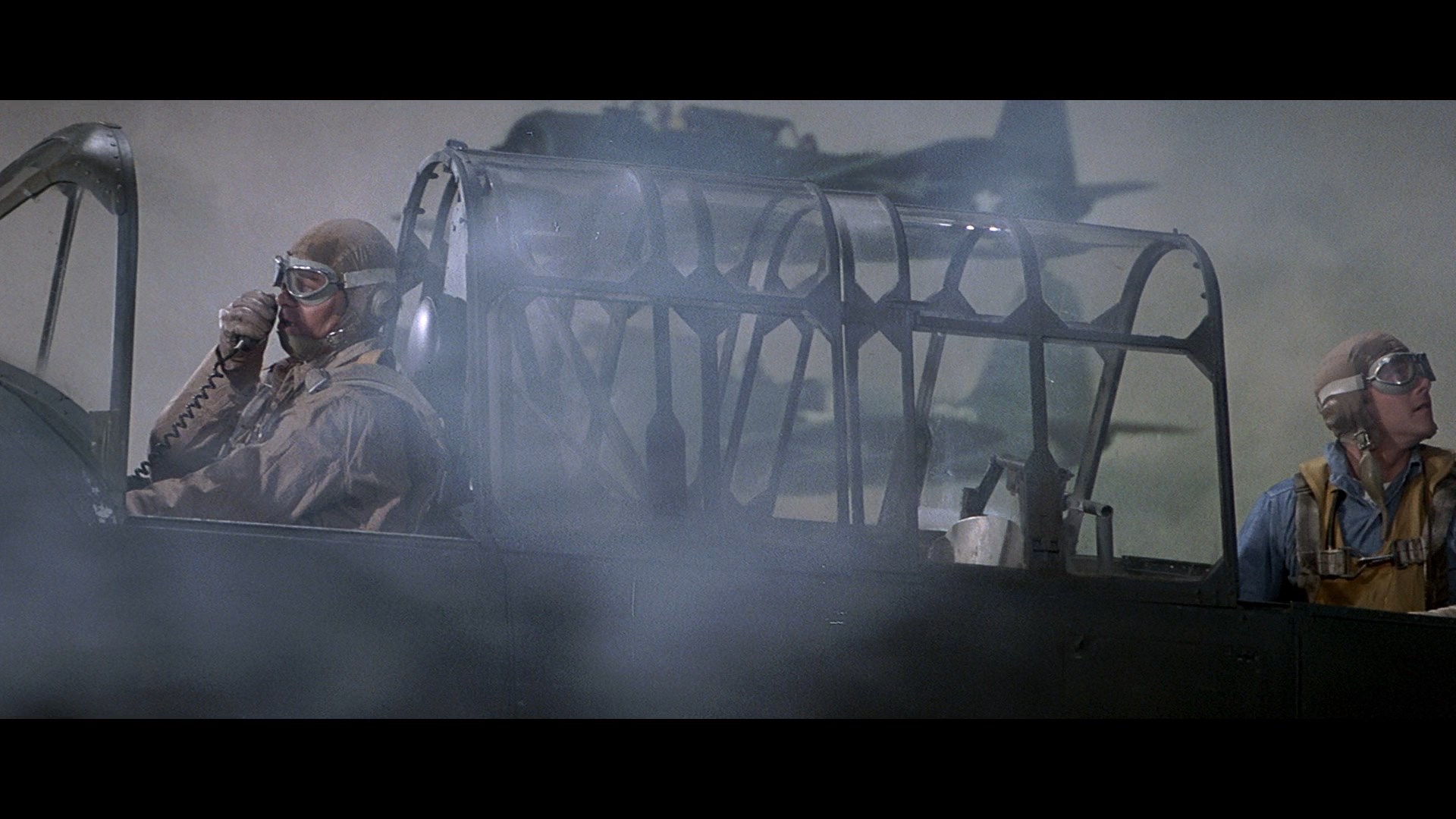 replaced soon after in 2001 by Universal itself with a release that upped the ante with a couple of solid featurettes, "The Making of Midway" (38m58s) featuring new interviews with Heston, Mirisch, Smight, and editor Frank J. Urioste, and "Sensurround: The Sounds of Midway" (4m19s) with Williams and the other prior participants. Williams also turns up for "The Score of Midway" (6m24s) looking strictly at the music itself. A Blu-ray in 2013 ported over the extras and featured a respectable HD upgrade that does what it can with the inconsistent nature of the patchwork material itself.
replaced soon after in 2001 by Universal itself with a release that upped the ante with a couple of solid featurettes, "The Making of Midway" (38m58s) featuring new interviews with Heston, Mirisch, Smight, and editor Frank J. Urioste, and "Sensurround: The Sounds of Midway" (4m19s) with Williams and the other prior participants. Williams also turns up for "The Score of Midway" (6m24s) looking strictly at the music itself. A Blu-ray in 2013 ported over the extras and featured a respectable HD upgrade that does what it can with the inconsistent nature of the patchwork material itself.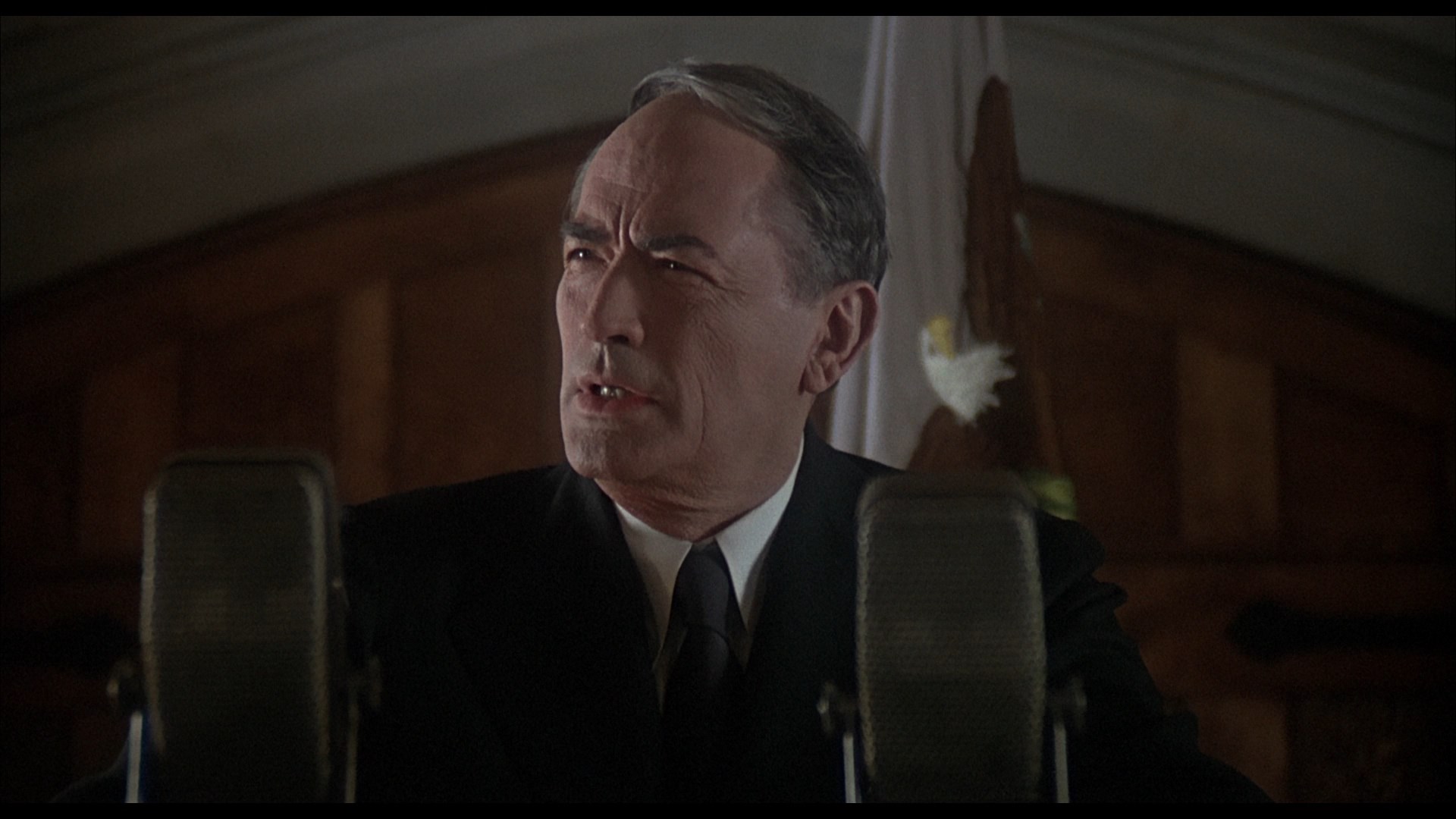 A year later, Universal
A year later, Universal 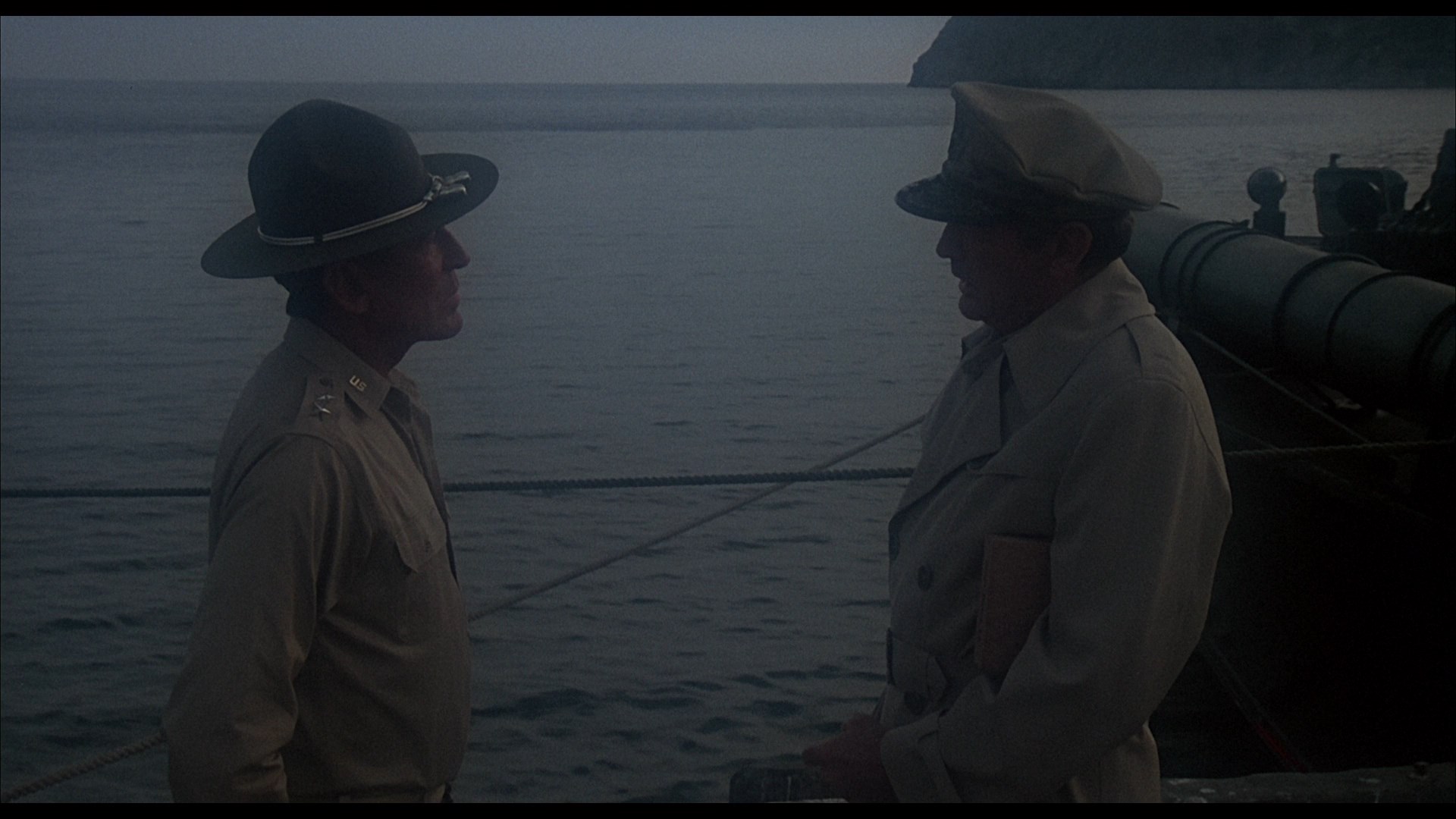 returned to World War II with another epic, MacArthur, which changes tactics here by focusing on one big star instead of lots of celebrities. What we get here is virtually a one-man showcase for Gregory Peck in MacArthur, a return to the big screen for TV-friendly director Joseph Sargent after his classic 1974 crime film, The Taking of Pelham One Two Three. This biopic charts the most famous period in the life of the legendary General Douglas MacArthur under two Presidents, Franklin D. Roosevelt (Halloween III: Season of the Witch's O'Herlihy) and Harry S. Truman (Salem's Lot's Flanders), framed through memories experienced later in life as he delivers a commencement speech to West Point military cadets. From there we jump to the aftermath of Pearl Harbor, where MacArthur gradually led the U.S. to military victory in the Pacific and played a decisive role in the end of the war. From there we go to the Korean War where his contentious relationship with Truman led to a major shift in his fortunes.
returned to World War II with another epic, MacArthur, which changes tactics here by focusing on one big star instead of lots of celebrities. What we get here is virtually a one-man showcase for Gregory Peck in MacArthur, a return to the big screen for TV-friendly director Joseph Sargent after his classic 1974 crime film, The Taking of Pelham One Two Three. This biopic charts the most famous period in the life of the legendary General Douglas MacArthur under two Presidents, Franklin D. Roosevelt (Halloween III: Season of the Witch's O'Herlihy) and Harry S. Truman (Salem's Lot's Flanders), framed through memories experienced later in life as he delivers a commencement speech to West Point military cadets. From there we jump to the aftermath of Pearl Harbor, where MacArthur gradually led the U.S. to military victory in the Pacific and played a decisive role in the end of the war. From there we go to the Korean War where his contentious relationship with Truman led to a major shift in his fortunes. 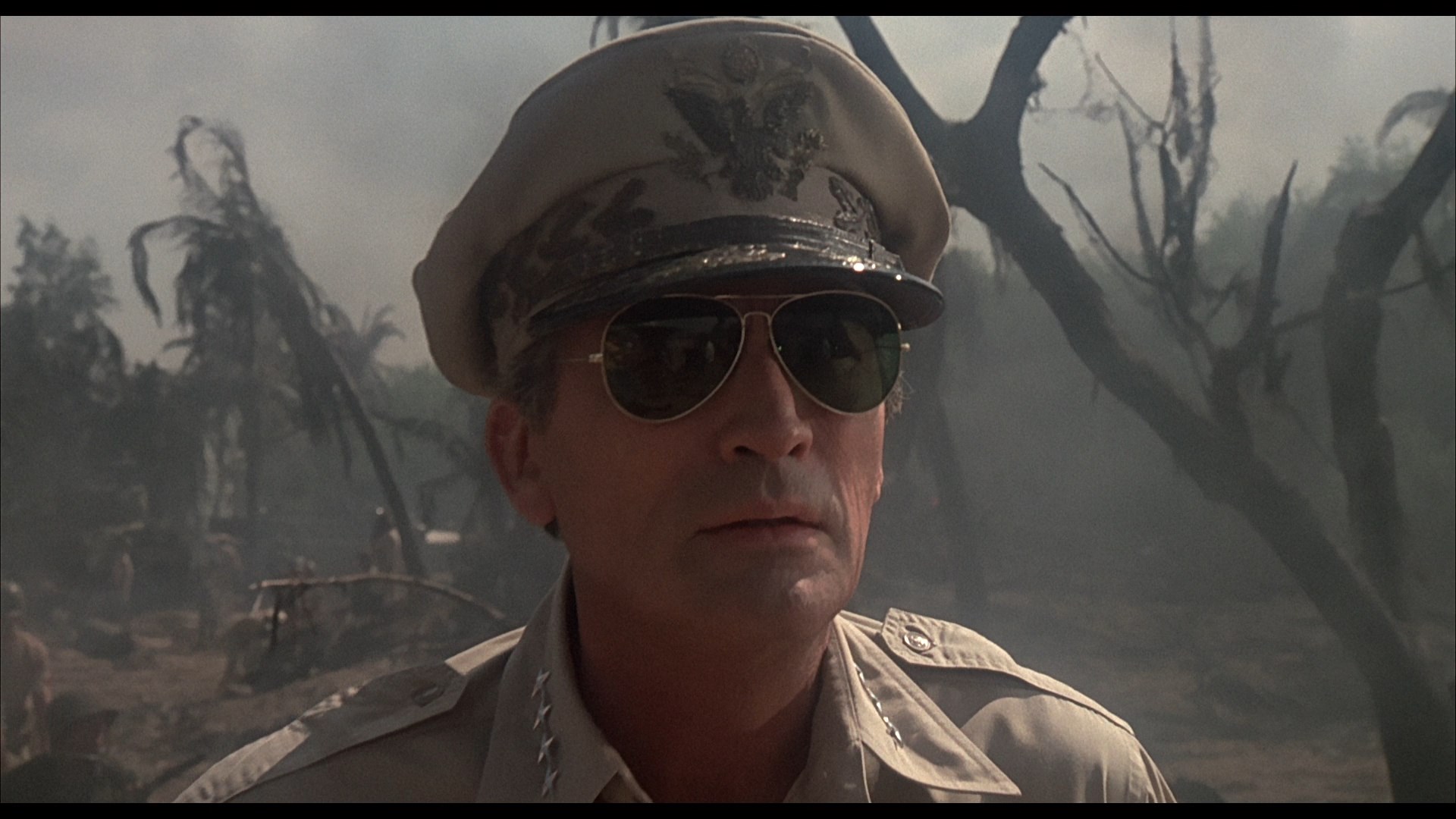 drawing comparisons in the minds of those for whom the real figure was still fresh. The actor's star quality makes all the difference here as he anchors a film that would otherwise have smacked of a made-for-TV miniseries, and though the film was given a
drawing comparisons in the minds of those for whom the real figure was still fresh. The actor's star quality makes all the difference here as he anchors a film that would otherwise have smacked of a made-for-TV miniseries, and though the film was given a 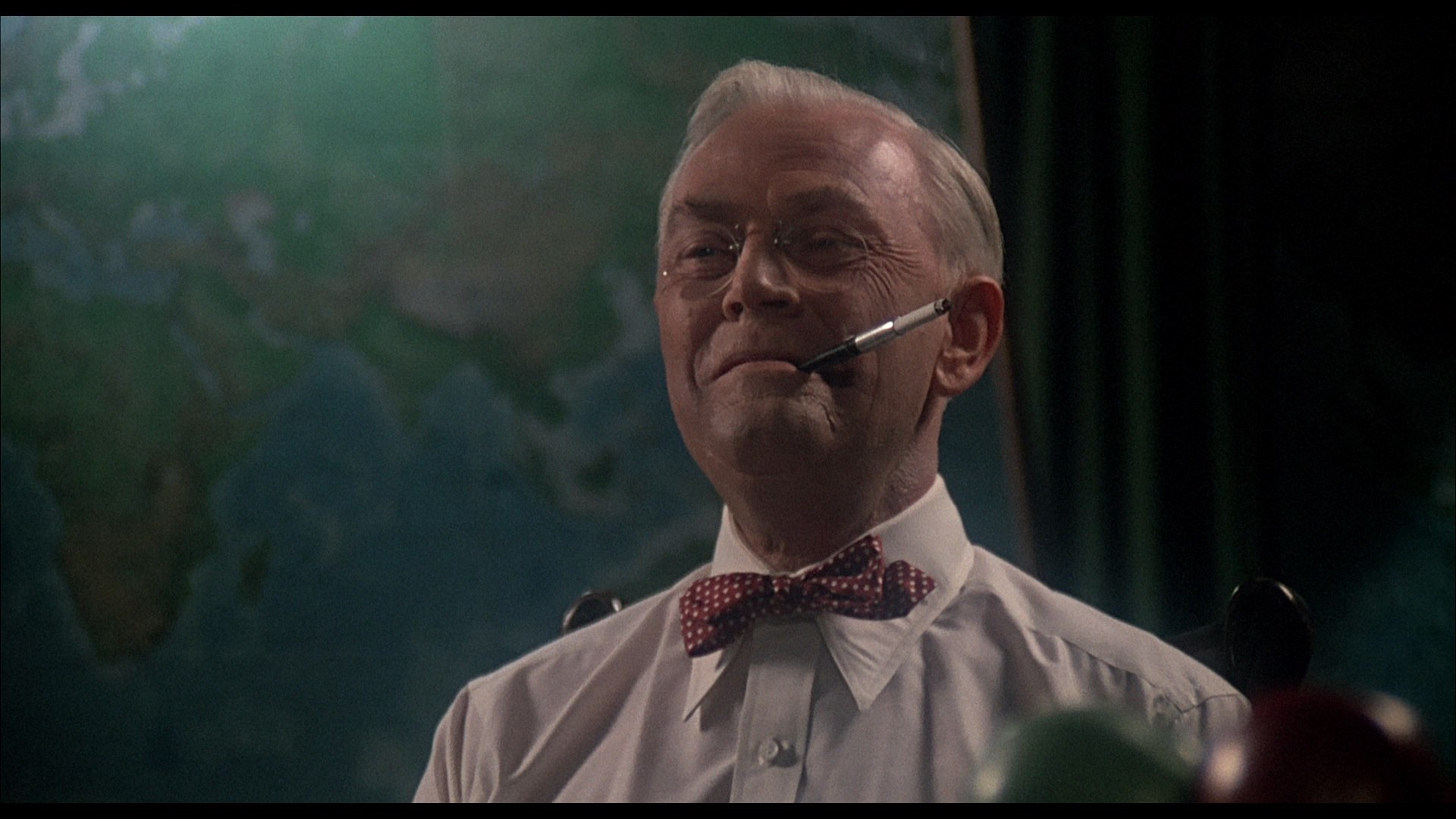 somewhat lukewarm reception upon its release, the subsequent spectacle of Laurence Olivier tackling the role in 1981's notorious Inchon certainly showed how far south things could have gone. Presumably chosen for his indelible work on Patton, composer Jerry Goldsmith came aboard here to provide the sparse but effective military-style score (and weirdly enough would provide a far more acclaimed and reissued score for Inchon, too).
somewhat lukewarm reception upon its release, the subsequent spectacle of Laurence Olivier tackling the role in 1981's notorious Inchon certainly showed how far south things could have gone. Presumably chosen for his indelible work on Patton, composer Jerry Goldsmith came aboard here to provide the sparse but effective military-style score (and weirdly enough would provide a far more acclaimed and reissued score for Inchon, too).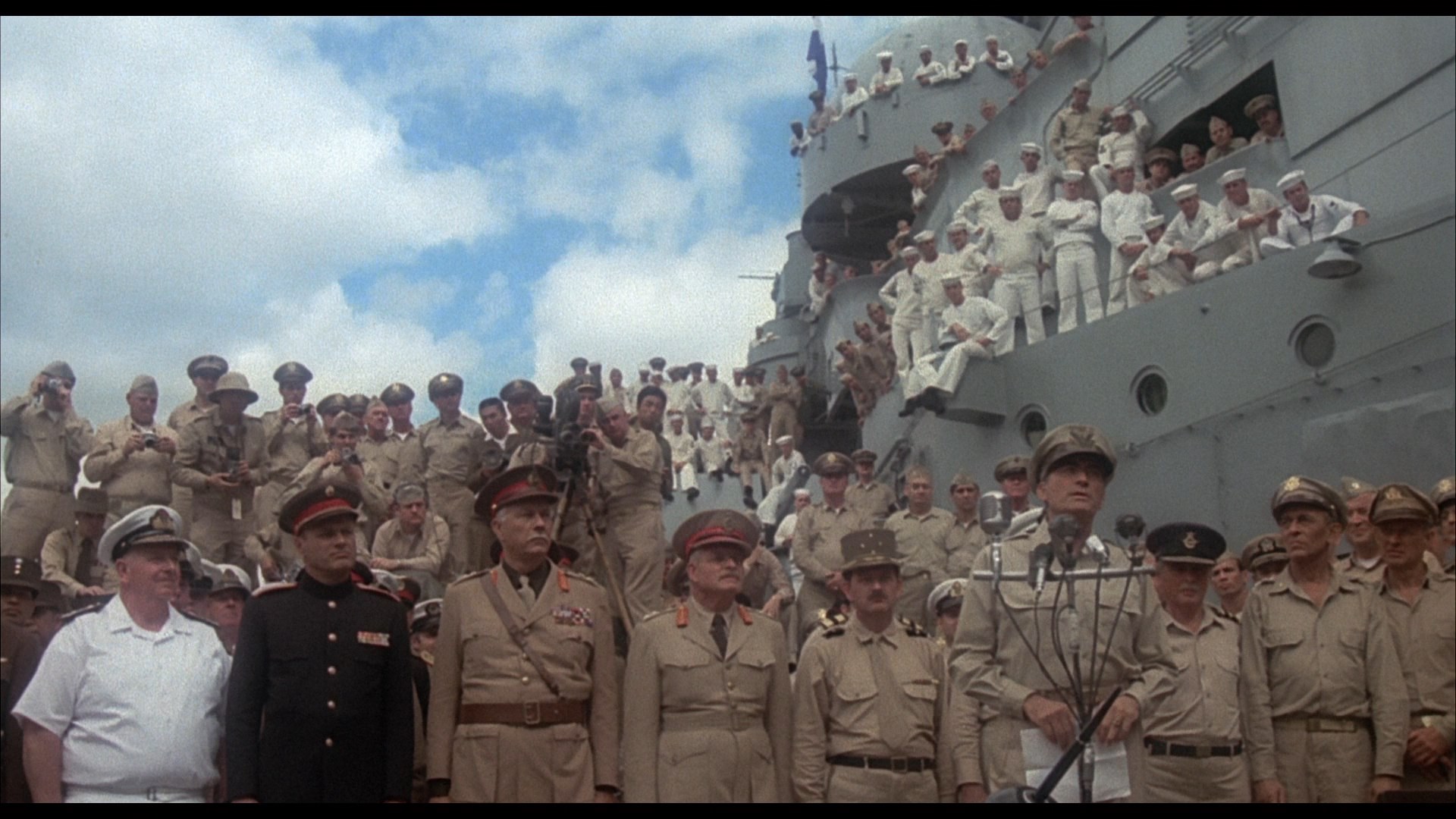 spread out to the other channels effectively enough. Mitchell and Rubin return for another thorough, well-researched commentary tackling the long period of mounting the film
spread out to the other channels effectively enough. Mitchell and Rubin return for another thorough, well-researched commentary tackling the long period of mounting the film 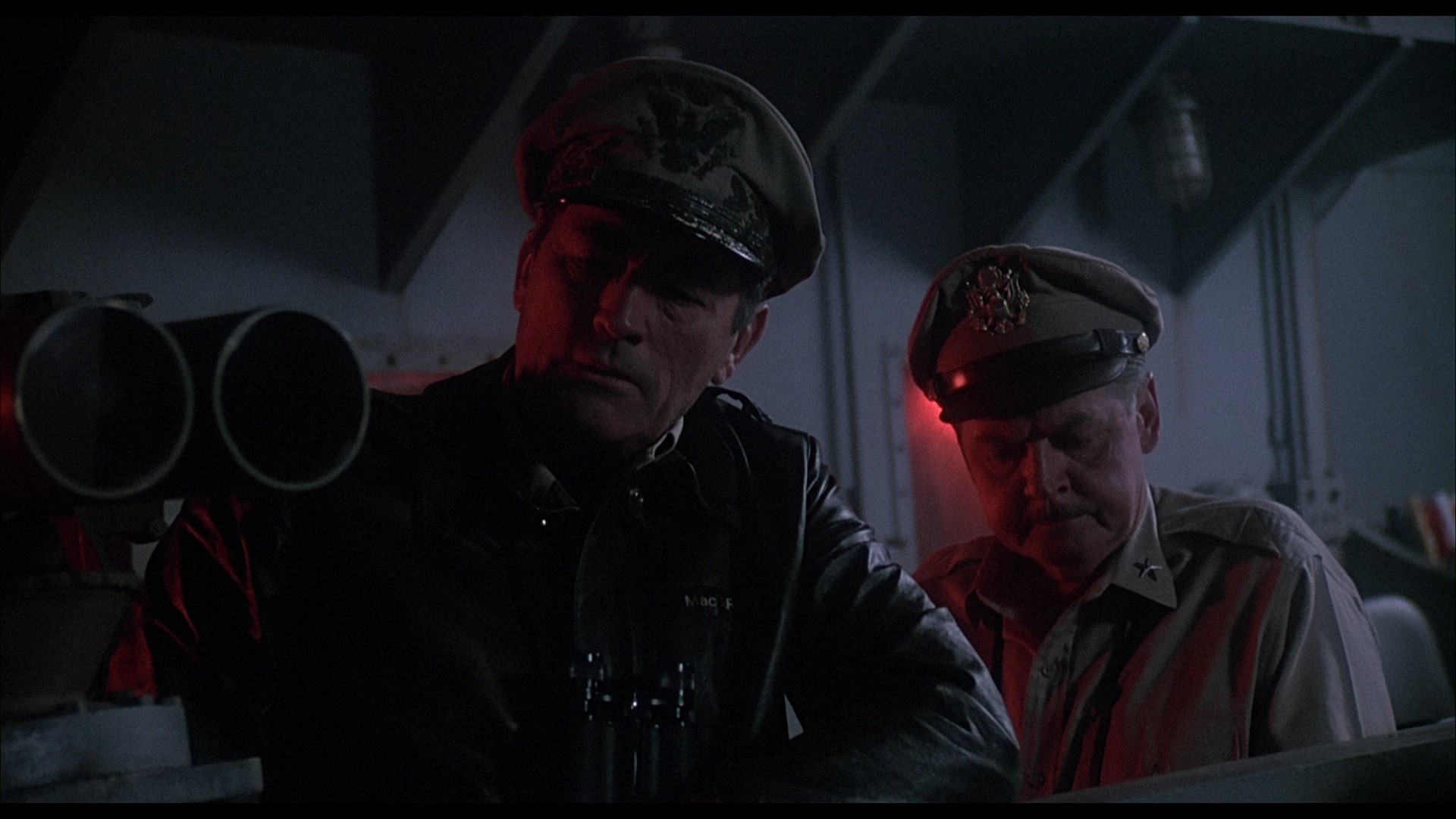 with considerable effort put into the screenplay through multiple hands, as well as the challenges of telling the story for younger generations who might not have the personal connection of those around at the time. Also present here is MacArthur: The Rebel General (128m57s), an alternate cut released on U.K. home video that swaps out some footage with the most notable addition being to the negotiations with Japan to end World War II. "General Disposition" (4m13s) is a brief 2004 video interview with Sargent about his time working with Peck, and the trailer is here from its usual SD source. The real MacArthur is featured in no less than six vintage newsreels: 1942's A Tribute to MacArthur (2m41s) and MacArthur in Australia (50s), 1944's MacArthur Returns to Philippines (4m39s), 1951's MacArthur Steps Down (2m3s) and MacArthur Addresses Congress (5m25s), and 1955's MacArthur Honored on 75th Birthday (38s). Also included are four radio spots, a generous stills and promo art gallery, and an insert booklet with a new essay by Robert Matzen, press articles on the film and real-life events, and sample critical reactions.
with considerable effort put into the screenplay through multiple hands, as well as the challenges of telling the story for younger generations who might not have the personal connection of those around at the time. Also present here is MacArthur: The Rebel General (128m57s), an alternate cut released on U.K. home video that swaps out some footage with the most notable addition being to the negotiations with Japan to end World War II. "General Disposition" (4m13s) is a brief 2004 video interview with Sargent about his time working with Peck, and the trailer is here from its usual SD source. The real MacArthur is featured in no less than six vintage newsreels: 1942's A Tribute to MacArthur (2m41s) and MacArthur in Australia (50s), 1944's MacArthur Returns to Philippines (4m39s), 1951's MacArthur Steps Down (2m3s) and MacArthur Addresses Congress (5m25s), and 1955's MacArthur Honored on 75th Birthday (38s). Also included are four radio spots, a generous stills and promo art gallery, and an insert booklet with a new essay by Robert Matzen, press articles on the film and real-life events, and sample critical reactions.![]()